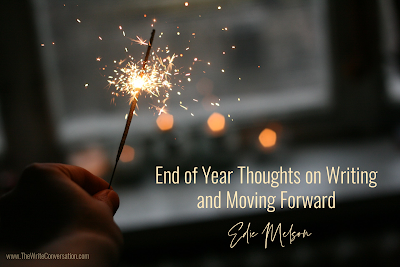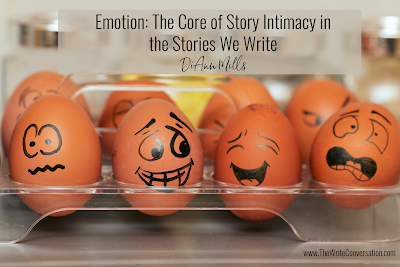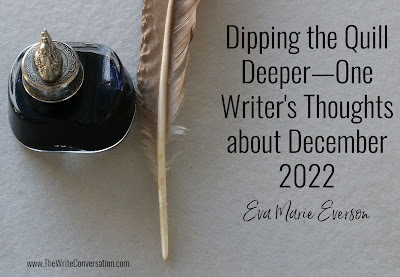Edie Melson's Blog, page 103
December 29, 2022
Conferences in 2023 for Speakers, Writers, and Leaders

by Yvonne Ortega @YvonneOrtega1
Save your money and make plans for 2023 for a conference that is live, virtual or a combination of both. I am listing only those that offer both a speaking track and a writers track with both traditional and indie publishers with some sessions that can fit in either track.
Advanced Writers and Speakers Association (AWSA)AWSA is a special fellowship of over 800 Christian women professional authors, entertainers, publishers and speakers who encourage and train one another. They are thrilled to have this opportunity to encourage you. AWSA is sponsored by the 501 (c) 3 nonprofit ministry of Right to the Heart
The main event is the annual AWSA conference which is just prior to the opening of the CBA (Christian Bookseller's Tradeshow). AWSA also sponsors the Golden Scroll Awards Banquet . Go to awsa.com to check for eligibility, associate membership, and an application.
Founder and CEO of AWSA: Linda Evans ShepherdDate of AWSA Conference: August 4 – 6, 2023Venue: Hyatt Regency; 401 W. High St. in Lexington, KY.Continue to check for 2023 updates. As a member of AWSA, I have attended the AWSA Conference more times than not and highly recommend it.
Blue Ridge Mountians Christian Writers ConferenceDirector of the BRMCWC: Edie Melson Assistant Director: Edwina Perkins1 Ridgecrest Dr.Black Mountain, NC https://www.blueridgeconference.com Cost: $375 per person Sunday – Thursday Meals: $150 per person (12 meals; Sunday Dinner- Thursday Lunch)Date: May 28, 2023 – June 1, 2023
I have also attended the Blue Ridge Mountains Christian Writers Conference several times and highly commend it. Wear comfortable shoes and prepare to walk on a beautiful campus.
Florida Christian Writers ConferenceDirectors: Eva Marie Everson and Taryn SoudersLake Yale Baptist Conference Center Leesburg, FLOctober 18 – 22, 2023
Registration open March 1, 2023This year’s intensive is nonfiction. Cost includes registration, lodging, and meals and will remain the same as in 2022. https://word-weavers.com/floridaevents Jessica Everson, Conference Manager
The Florida Christian Writers Conference is outstanding and offers both a speaking track and a writers track with some sessions that fit in either one. I attended once and can recommend it without reservation.
She Speaks ConferenceCharlotte, NCJuly 13 – 14, 2023In-person and online https://shespeaksconference.com/ Excellent conference with both a speaking track and a writing track along with sessions that fit in either track.I have attended the She Speaks Conference and the Advanced She Speaks. I highly endorse it.
Speak Up Conference, a Carol Kent MinistryCarol Kent, Founder and Executive DirectorGrand Rapids, MichiganJuly 13-15, 2023 In-person and online Speak Up Conference
Premier conference training the next generation of Christian communicators: writers, speakers, and leadersI have attended the Speak Up Conference several years in a row and the Advanced Speak Up in Michingo, MI years ago. I’m blessed to be on the prayer team for this conference. I highly recommend it.
Write His Answer Virtual Conference-Greater Philadelphia CWC Combined with the Colorado CWC into one virtual conferenceDirector, Write His Answer Ministries, Marlene BagnullAugust 9–12, 20223Get on the mailing list for updates at https://www.colorado.writehisanswer.com I have attended and presented at both the Philly CWC and the Colorado CWC. I’m blessed to present again this year and highly encourage you to sign up on the mailing list for updates.
Enjoy checking each conference to see which one speaks to your heart. Trust God’s Holy Spirit to help you decide.
TWEETABLEConferences in 2023 for Speakers, Writers, and Leaders, compiled by speaker and author @YvonneOrtega1 on @EdieMelson (Click to Tweet)
 Yvonne Ortega walks with a small footprint, leaving a giant imprint in the lives of those she meets. Within this power-packed package is a professional speaker who offers encouragement, support, and accountability. Her calling to help women who face challenges move forward and live the abundant life through Christ has endeared her to thousands. As a gifted instructor, she helps those who speak and write make connections and find community. In addition to being a multi-published author, known for her Moving from Broken to Beautiful Series, she has degrees in Spanish and English and a master’s degree in education in counseling from the College of William & Mary.
Yvonne Ortega walks with a small footprint, leaving a giant imprint in the lives of those she meets. Within this power-packed package is a professional speaker who offers encouragement, support, and accountability. Her calling to help women who face challenges move forward and live the abundant life through Christ has endeared her to thousands. As a gifted instructor, she helps those who speak and write make connections and find community. In addition to being a multi-published author, known for her Moving from Broken to Beautiful Series, she has degrees in Spanish and English and a master’s degree in education in counseling from the College of William & Mary.You can find Yvonne at YVONNEORTEGA.COMAMAZON AUTHORFACEBOOKYOUTUBETWITTER
Featured Image: Photo by Marcos Luiz Photograph on Unsplash
Published on December 29, 2022 22:00
December 28, 2022
End of Year Thoughts on Writing and Moving Forward

by Edie Melson @EdieMelson
The writer’s path is a journey of a lifetime—one fraught with discovery and discouragement. We can avoid some of its pitfalls if we define that path early on. Today, I want to share some insights into my writing journey and the markers I look for to help me stay at least in the vicinity of the path.
This time of year, between Christmas and New Year's, my thoughts turn backward. I use this time to evaluate the past year and prepare for the next one. I've given up New Year's Resolutions completely and find the freedom from those expectations (and failures) a major relief.
Instead, I spend some time looking back at our spiritual markers for the past year. I evaluate them over all aspects of my life—including my writing life.
This is particularly helpful since staying on the writer's path is difficult. We can loose perspective if we compare ourselves to others because each of our paths are so unique and varied. In the past I've had trouble evaluating my progress because I was comparing my journey to someone else's. I’ve come up with some questions to help me process where I’ve been and where I’m headed.
Questions to Get Me StartedWhat were some of my writing successes this past year? (Not necessarily the most lucrative, but the most rewarding) What were some of my writing setbacks this past year? What writing advice stands out in my mind because it seemed to have been aimed directly at me? What brought me the most joy? (Writing related) What were the most frustrating writing experiences this year?As I map out these spiritual markers, the path God has had me on becomes quite clear. And, by knowing where I've been, it becomes clearer where to go next.
The other thing I do this time of year is to choose my ONE WORD and SCRIPTURE for the next year. I've been choosing a Bible verse for the upcoming year since 1996, but I only began choosing a single word to go with it since 2012. My close friend and author, Beth Vogt started me on it and the practice has proved invaluable. She shared about that this month in the post, Writers, One Word Makes All the Difference .
I use this one word as a filter, a path marker and a reminder of where God is focusing my attention during the year. And every year it has helped clarify my journey when things get murky and confusing.
ONE WORD
This year, the ONE WORD God has whispered to me is INTENTIONAL.
I have to be honest, I struggled to land on a single word. I don't have anything against using a phrase, but for me, the single word is a more powerful way to evaluate my daily walk with the Lord.
The verse I feel like God has led me to go along with this is:
Pay careful attention, then, to how you walk—not as unwise people but as wise—making the most of the time, because the days are evil. So don’t be foolish, but understand what the Lord’s willis. (Ephesians 5:15-17 HCSB)
I'd love for you to share your ONE WORD and/or Bible verse for the year, and hear some of your answers to these questions.
Don’t forget to join the conversation!
Blessings,Edie
TWEETABLEEnd of Year Thoughts on Writing and Moving Forward from @EdieMelson (Click to Tweet)
 Edie Melson is a woman of faith with ink-stained fingers observing life through her camera lens. She’s a writer who feels lost without that device & an unexpected speaker who loves to encourage an audience. She also embraces the ultimate contradiction of being an organized creative. She knows the necessity of Soul Care and leads retreats, conferences & workshops around the world on staying connected to God. Her numerous books, including the award-winning Soul Careseries & reflect her passion to help others develop the strength of their God-given gifts. Her blog, The Write Conversation is recognized as one of the top 101 industry resources.
Edie Melson is a woman of faith with ink-stained fingers observing life through her camera lens. She’s a writer who feels lost without that device & an unexpected speaker who loves to encourage an audience. She also embraces the ultimate contradiction of being an organized creative. She knows the necessity of Soul Care and leads retreats, conferences & workshops around the world on staying connected to God. Her numerous books, including the award-winning Soul Careseries & reflect her passion to help others develop the strength of their God-given gifts. Her blog, The Write Conversation is recognized as one of the top 101 industry resources. She and husband Kirk have been married 40+ years and raised three sons. They live in the foothills of the Blue Ridge Mountains and can often be found hiking—with Edie clinging to the edge of a precipice for the perfect camera angle and Kirk patiently carrying her camera bag and tripod. Connect with her on her website, www.EdieMelson.com and through social media.
Featured Image: Photo by Danil Aksenov on Unsplash
Published on December 28, 2022 22:00
December 27, 2022
Emotion: The Core of Story Intimacy in What We Write

by DiAnn Mills @DiAnnMills
Story intimacy occurs when the writer successfully bonds a character to the reader in a relationship that defies the fictional realm. Emotion lies at the center of their attachment by igniting emotions in varying degrees of positive and negative responses—whether conscious or subconscious. The complexity occurs when motivation triggers feelings, behavior, and personality into expressions of specific actions. These unique truths can be subjective or objective but real to the character. The value of understanding emotion means a writer successfully connects the core of our humanity to a character walking through the pages of a story and shows how life’s happenings affect him/her.
Logic anchors at an opposite end of the spectrum from emotions. Emotions don’t rely on a gathering of information, processes, or analysis but internal sentiments based on a sundry of events. Yet, showing a legitimate emotion like anger when someone runs a stop sign and hits your car is a logical reaction. The depth of the anger and how it’s shown and internalized depends on life experiences.
Intimacy draws the reader closer to the story, eliminating boundaries to form an attachment outside what appears logical. A kinship occurs in sympathy and compassion for the character’s plight. The reader escapes their reality to worry, fret, cry, cheer, laugh, celebrate, and a host of other feelings. Those reactions don’t have to match the character’s for the reader to identify with the situation, only relationally connect.
A story that resonates with a reader is buried deep within the character’s spirit. The writer’s job is to bring the adventure to life and pave the way for the reader to recognize a connection point. Sometimes the character tamps down what they believe is impossible for them to achieve. Maybe the character lacks confidence or the tools to accept a challenge. The desire stays buried until an action, or a series of actions, yanks motivation to the surface. What is the character willing to fight for? Struggle to attain? Sacrifice for the betterment of others? Perhaps give up their life to protect? Pose those questions to the character. The answers won’t easily jump onto the page because they are sensitive, personal. A worthy character deserves the right to privacy and to establish trust with the writer before unveiling deep-rooted secrets.
Establishing motivation is the key to creating unique emotions that unlock the character’s true self, the story’s core. Jotting down a goal or a problem to solve means nothing without a vehicle to drive the behavior.
So how do we discover motivation and grasp the heart of a story? Examine what the character wants more than anything in the world. Why? Is the item tangible or intangible? What is its value? Is it realistic? Is he/she afraid to pursue the want? Beyond the want, what does the character need? Is the want a disguise for what is needed for physical, mental, or spiritual well-being? Are the clues in the backstory? None of these are easy to answer and take time and patience.
According to Tonya Reiman in The Power of Body Language, the world and its people share seven universal emotions: surprise, fear, anger, sadness, disgust, happiness, and contempt. Doesn’t it make sense for our character to experience all seven in a story? Even multiple times?
Emotion uses feelings and instincts for the character to draw conclusions about circumstances based on their life. The response begins in the mind where the character chooses what will occupy time and energy. The expression can remain internal and/or manifest externally
The bigger the action that prompted the reaction or emotion, the more intense the response. A character doesn’t experience one distinct feeling but a collection at different levels. We are too complex to fit an established pattern or template. Show the emotions with different responses and reactions that fit the circumstances and the character’s traits. Think back on a highly emotive incident in your life. How did you react and work through the happening? Now imagine walking through the same situation again. Would you respond the same way? Probably not, which is why our characters show varied emotions. That makes them real.
Emotion in a scene must equal the tension and conflict of the story. If there is too much, then the scene is overdone. If there is too little, the scene falls flat. Balance is the key to credibility.
“A writer can never dig too deeply into a character’s life to discover the core of why of a story’s intimacy. Stories can entertain, sometimes teach or argue a point. But for me the essential thing is that they communicate feelings. That they appeal to what we share as human beings across our borders and divides. There are large glamorous industries around stories; the book industry, the movie industry, the television industry, the theatre industry. But in the end, stories are about one person saying to another: This is the way it feels to me. Can you understand what I'm saying? Does it also feel this way to you?” Kazuo Ishiguro
Reprinted from Exploring the Art of Emotion and Dialogue with permission from Bold Vision Books
TWEETABLEEmotion: The Core of Story Intimacy in What We Write, insight from author @DiAnnMills on @EdieMelson (Click to Tweet)
 DiAnn Mills is a bestselling author who believes her readers should expect an adventure. She creates action-packed, suspense-filled novels to thrill readers. Her titles have appeared on the CBA and ECPA bestseller lists; won two Christy Awards; and been finalists for the RITA, Daphne Du Maurier, Inspirational Readers’ Choice, and Carol award contests.
DiAnn Mills is a bestselling author who believes her readers should expect an adventure. She creates action-packed, suspense-filled novels to thrill readers. Her titles have appeared on the CBA and ECPA bestseller lists; won two Christy Awards; and been finalists for the RITA, Daphne Du Maurier, Inspirational Readers’ Choice, and Carol award contests. She is the former director of the Blue Ridge Mountain Christian Writers Conference, Mountainside Marketing Retreat, and Mountainside Novelist Retreat with social media specialist Edie Melson. Connect here: DiAnnMills.com
Published on December 27, 2022 22:00
December 26, 2022
Dipping the Quill Deeper—One Writer's Thoughts about December 2022

by Eva Marie Everson
Accompany me to-day, O Spirit invisible, in all my goings, but stay with me also when I am in my own home and among my kindred. Forbid that I should fail to show to those nearest to me the sympathy and consideration which thy grace enables me to show to others with whom I have to do. Forbid that I should refuse to my own household the courtesy and politeness which I think proper to show to strangers. Let charity to-day begin at home. ~John Baillie, A Diary of Private Prayer
Scottish-born theologian John Baillie (1886-1960) wrote his highly praised book, A Diary of Private Prayer almost 100 years ago, yet the words of this one prayer ring as true today as they did when he penned them. To me, especially during this Advent season, they hold special significance.
We often say that this time of year is a time to reflect upon the One who came—Emmanuel, God with us. But then we also fill our calendars with church events and choral performances, parties and other various forms of get-togethers, shopping trips where we find ourselves in a frenzy of other shoppers followed by those frantic rushes back to the mall or the store to pick up that one thing we forgot (or checking our Amazon order to make sure the item will arrive by Christmas), decorating both inside and outside our homes, dinners made and cookies baked, and wrapping presents for under the tree. And on . . . and on . . . and on. We fill the “twelve days of Christmas” with enough activities to fill a twelve-month calendar.
This time of year, which should be the happiest and the merriest of all—because we remember Him and the gifts He continues to give—can often become anything but. And, for we writers who often find ourselves with end-of-the-year projects or deadlines (such as: I will have this done by December 31 . . . I will, I will, I will . . .), the stress level escalates to nearly untamable proportions. We may even reach January 1 with a blink and with a, “Did I miss Christmas?” question on our tongues.
Sometimes, in all the this and the that of Christmas, we miss the very ones who are (or should be) the most important to us—those who are among those most precious gifts God gave to us—our family. We erroneously and subconsciously leave them in the dust of our holiday preparations and expectations.
And so, as the year 2022 draws to a close, my prayer for you, Dear Writer Friend of Mine, is that you will take the time to breathe, to remember the Reason for the Season, to set your pen aside (and maybe some of those other obligations that aren’t nearly as important as you thought), and be with those God gave you, those you call family.
Merry Christmas!Eva Marie
TWEETABLEDipping the Quill Deeper—One Writers Thoughts about December 2022 from Eva Marie Everson on @EdieMelson (Click to Tweet)
 Eva Marie Everson is the CEO of Word Weavers International, the director of Florida Christian Writers Conference, and the contest director for Blue Ridge Mountains Christian Writers Conference. She is the multiple award-winning author of more than 40 books and countless articles and blogposts. She is also an award-winning speaker and a Bible teacher and the most recent recipient of the AWSA Lifetime Achievement Award (2022).
Eva Marie Everson is the CEO of Word Weavers International, the director of Florida Christian Writers Conference, and the contest director for Blue Ridge Mountains Christian Writers Conference. She is the multiple award-winning author of more than 40 books and countless articles and blogposts. She is also an award-winning speaker and a Bible teacher and the most recent recipient of the AWSA Lifetime Achievement Award (2022). Eva Marie is often seen at writers conferences across the States. She served as a mentor for the Jerry B. Jenkins Christian Writers Guild and taught as a guest professor at Taylor University in 2011. She and her husband make their home in Central Florida where they enjoy their grandchildren. They are owned by one persnickety cat named Vanessa.
Eva Marie's latest book, THE THIRD PATH, takes a look at 26 of the questions God asked in the Bible, then makes them personal to the reader. The premise of the book is currently her most asked for continuing workshop at writers conferences.
Featured Image: Photo by Pierre Bamin on Unsplash
Published on December 26, 2022 22:00
December 25, 2022
Fall and Winter Festivals—a Writer’s Smorgasbord

by Ane Mulligan @AneMulligan
Fall festivals have their origins in pagan times. Known as Harvest Festival, it’s one of the oldest and most traditional festivals, taking place at the time of the Harvest Moon or when the harvest is over. Prior to Victorian times, farmers would lay on a harvest feast, where a corn dolly might be given a place of honor and hung up in hope of a good harvest the following year. Some harvesters felt it was bad luck to cut the last stalk of corn standing. Farms would compete, racing to finish first.
 In Sugar Hill, where I live, has a Fall festival called Sugar Rush (isn’t that a great name?.) It is a time to gather downtown to celebrate Fall with the Arts. It includes street vendors, food, and our volunteer groups, like the Women’s Club and my Community Theatre troupe, host booths. One can indulge in face painting, try various crafts, listen to live music, and just enjoy the festival. This year to the delight of children of all ages, the city placed 20 skeletons climbing all over the Eagle Theatre. One was 10 feet tall.
In Sugar Hill, where I live, has a Fall festival called Sugar Rush (isn’t that a great name?.) It is a time to gather downtown to celebrate Fall with the Arts. It includes street vendors, food, and our volunteer groups, like the Women’s Club and my Community Theatre troupe, host booths. One can indulge in face painting, try various crafts, listen to live music, and just enjoy the festival. This year to the delight of children of all ages, the city placed 20 skeletons climbing all over the Eagle Theatre. One was 10 feet tall. But my favorite of all celebrations is the Christmas Celebration our city hosts. We have an outdoor ice-skating rink (November to March), live performances in the amphitheater, street performers, carolers, the lighting of the town Christmas tree, and of course Santa Claus (aka Bill Harting).
Our main street is only a single block long with City Hall at one end and the e-Center (retail, offices and a gym) at the other end. So every available empty space has a lighted photo opportunity. It’s a wonderland of lights, my personal favorite of all Christmas décor.
I’ve gleaned many ideas to include in stories from festivals. So many people in one place—it’s a writer’s smorgasbord! I used the voice memo app on my phone to capture my thoughts and the camera to capture photos of those thoughts.
Now it’s your turn. What’s your favorite tradition at festivals, whether Fall or Christmas?
TWEETABLEFall and Winter Festivals—a Writer’s Smorgasbord, thoughts from author @AneMulligan on @EdieMelson (Click to Tweet)
 Ane Mulligan has been a voracious reader ever since her mom instilled within her a love of reading at age three, escaping into worlds otherwise unknown. But when Ane saw Mary Martin in PETER PAN, she was struck with a fever from which she never recovered—stage fever. She submerged herself in drama through high school and college. Years later, her two loves collided, and a bestselling, award-winning novelist emerged. She resides in Sugar Hill, GA, with her artist husband and a rascally Rottweiler. Find Ane on her website, Amazon Author page, Facebook, Twitter, Instagram, Pinterest and The Write Conversation.
Ane Mulligan has been a voracious reader ever since her mom instilled within her a love of reading at age three, escaping into worlds otherwise unknown. But when Ane saw Mary Martin in PETER PAN, she was struck with a fever from which she never recovered—stage fever. She submerged herself in drama through high school and college. Years later, her two loves collided, and a bestselling, award-winning novelist emerged. She resides in Sugar Hill, GA, with her artist husband and a rascally Rottweiler. Find Ane on her website, Amazon Author page, Facebook, Twitter, Instagram, Pinterest and The Write Conversation.Featured Image: Photo by Almos Bechtold on Unsplash
Published on December 25, 2022 22:00
December 24, 2022
It Really is a Wonderful Life

by Dr. Craig von Buseck @CraigVonBuseck
Like many of you, one of my favorite Christmas movies is “It’s a Wonderful Life.” We all know the classic tale of a talented young man named George Bailey who dreams of adventure in exotic lands. He sees himself going to college and becoming a great architect and builder. These hopes are shattered when his father dies suddenly and George is forced to take over the family business.
George postpones his own dreams due to a feeling of love and obligation for his family. This becomes painfully clear when a crisis arises and in a fit of anger he kicks over a model of a suspension bridge and a high rise building—the remnants of his dream to be an architect.
It’s in these dashed hopes where we often see ourselves. You may desire to be a revered best-selling author and speaker. Yet the reality may be that you work a job which you only endure—or worse, despise—and you write when you can, early in the morning, at night, or on the weekends.
Like George, the responsibilities of life have you tied down to a life that can often seem like drudgery.
Later, when his absent-minded uncle misplaces a large sum of money, George is faced with the possibility of going to jail. After a futile search for the funds, George cries out to heaven in desperation. God answers this prayer by sending a gentle, simple-minded angel named Clarence to help him.
“It figures I’d get an angel like you,” George laments. “It would have been better if I was never born.”
Clarence arranges for George to see what life would have been like if he had not been there to influence the world around him. George discovers that many of the people he loved would have suffered greatly, or even died, if he had not been there to help them.
In this touching story we can see that just like George Bailey, God created each of us with a purpose to fulfill. The Apostle Paul writes,
For we are His workmanship, created in Christ Jesus for good works, which God prepared beforehand so that we would walk in them. (Ephesians 2:10, NASB)
If God has gifted you as a writer and speaker, then it’s for a purpose. Ours is not to fret over how many people are reading our stuff. If one life is changed and transformed by the gospel through our writing, then isn’t that enough? And if we are doing our part to get the word out, then with God’s help, we will reach many more than just one.
Immanuel—God with Us
During the Christmas season we sing the classic hymn, "O Come, O Come Immanuel," but have you ever thought about what this familiar song means? The text is based on the biblical prophecy from Isaiah:
All this took place to fulfill what the Lord had spoken by the prophet: “Behold, the virgin shall conceive and bear a son, and they shall call his name Immanuel” (which means, God with us). (Matthew 1:22-23, ESV)
God gave Jesus to mankind as the first Christmas present. Through our writing and speaking, we give that present to others again and again and again. This is part of our role of being co-laborers with God in His work of reconciling the world to Himself.
And all of this is a gift from God, who brought us back to himself through Christ. And God has given us this task of reconciling people to him. (2 Cor. 5:18, NLT)
In every word you write and every message you proclaim, you are a part of this glorious ministry of reconciliation.
We Are Not Alone
Let’s remember that as writers and speakers, we are not alone. Another way that God is Immanuel in our lives is through the Holy Spirit that dwells with us. Jesus promised that this ‘Helper’ would remain with us forever!
And I will ask the Father, and he will give you another Helper, to be with you forever, even the Spirit of truth… (John: 14:16-17, ESV).
Since Jesus’ death and resurrection, God exists with us in a whole new way. He is as close as a whisper and He is available to guide us and help us. This is a tremendous advantage for the Christian writer and speaker.
It’s almost not fair to have God Himself helping us with our writing, but that is what He promises to do! So we should take full advantage of this divine help. As I work on various projects, I’m constantly asking the Holy Spirit to help me. I find it to be truly remarkable when He does and I recognize the thoughts flowing through me and onto the page are not my own.
I Am His Pencil
Mother Teresa spoke of this mystery when she declared: “I am a little pencil in God's hands. He does the thinking. He does the writing. He does everything and sometimes it is really hard because it is a broken pencil and He has to sharpen it a little more.”
It’s important for us to recognize that through our writing, we are God’s little pencil.
Like George Bailey, it may be that God will call you to give up, or maybe postpone your own dreams for the sake of those who you love. But do not loose heart, because you can never out-give God. In the movie, George Bailey discovers this truth when the friends and family members he had helped over the years rush to his aid in his time of need.
And like George Bailey, you and I can make a tangible difference in the lives of those around us by letting the light of Jesus shine through our writing. In this season of giving, let’s consider how God may be calling us to give of ourselves to others—and trust Him to get your writing in front of the person who needs to see it most!
So have a very merry Christmas knowing that God loves you—and He has given you the gift of His Spirit so you can be empowered to give that gift to others through your writing. As you sow into the lives of others, may you reap a harvest of love and discover that in Christ, this truly is a wonderful life!
Watch for Craig’s new book, Telling the Truth: How to Write Narrative Nonfiction and Memoir from Bold Vision Books.
TWEETABLEIt Really is a Wonderful Life, insight and encouragement from @CraigVonBuseck on @EdieMelson (Click to Tweet)
 Dr. Craig von Buseck is an award-winning author, international speaker, and Digital Content Director for Focusonthefamily.com. More from Craig at vonbuseck.com.
Dr. Craig von Buseck is an award-winning author, international speaker, and Digital Content Director for Focusonthefamily.com. More from Craig at vonbuseck.com.Featured Image: Photo by Annie Spratt on Unsplash
Published on December 24, 2022 22:00
December 23, 2022
The Top Ten Truths for Writers About Feedback

by Zena Dell Lowe @ZenaDellLowe
One of the hardest things to learn as a human being is how to take constructive criticism with grace. It's difficult to hear negative feedback about things we've said or done or written without being defensive in some way. Years ago, I read a description about a character that struck me to the core. I can't remember the book or character but I remember the words. They read simply: "There was no knee-jerk defensiveness in him." I so badly wanted that to be true about myself.
While I can't pretend to have mastered this in my personal life, I have made great strides in my writing life, mostly because I've come to see feedback in this realm differently. Nevertheless, the old temptation to defend or debate is always just below the surface, and I see many writers giving into this temptation on a regular basis. To that end, I've written a little something to help writers rethink the process of hearing and receiving feedback, so that they can utilize that feedback for success rather than defeat.
THE TOP TEN TRUTHS FOR WRITERS ABOUT FEEDBACK
1. Know that all comments and feedback are just suggestions or ideas that usually point to a bigger issue in the story. Your job as a writer is to look beyond the specific notes for the root cause.
2. You don't need to, nor should you, defend or justify your choices. That will not serve you well. Studios don't like to work with people who can't take notes, and a defensive response where the writers attempt to demonstrate why a particular note is "wrong" will only communicate that the writer can't take notes and are too defensive to work with.
3. This doesn't mean the writer must take EVERY note, nor does it mean the notes are good. Indeed, I've gotten some TERRIBLE notes from studios and producers and teachers and other writers. Nevertheless, my job is to NEVER try to show them how they're wrong about their notes. That is a major slap in their face. My job (and yours) is to sift through those notes and try to see what's behind them, because nine times out of ten, it means that something in the story isn't working.
4. The worst thing writers can do is be "precious" with their work. It can't be sacred to you. You need to listen. You need to recognize that there is always room for improvement. Remember, nobody gives notes or feedback or comments or suggestions on a scene or story that works. And nobody gives notes or feedback for their own benefit, but for yours. So, don't debate. Look deeper. Again, what's the real note beneath the notes?
5. You get to keep or discard any of the feedback you receive so long as you address the underlying issue. So, if someone suggests how to solve a problem and you know it doesn't work for the story, you are under no obligation to keep that suggested solution. You ARE, however, obligated to address the root cause that prompted the note. This means that if someone offers a solution that doesn't work, you must find a solution that does. It still behooves you to try to see what prompted the suggestion in the first place.
6. Reframe the paradigm. Change your mind about what feedback means. If you start looking at notes and feedback from a "joint-effort" perspective, where the end goal is simply to make the work better, you'll never be defensive again. Rather, you'll be excited to get feedback. You'll be eager to hear when something isn't working, because it'll make you see areas that you currently cannot because you're too close to the forest to see the trees, and it'll help you discover new and exciting ways to fix it.
7. Feedback is a gift. It's not something you're entitled to. It's not something you deserve. It's not something that everyone gets. It's a big deal for someone to take the time and effort to read your stuff and give feedback. Cherish this gift as you should. To debate their feedback is an insult to their efforts and they'll think twice before giving you their time again or putting their neck on the line for you. So, don't spit in their face by debating with them or telling them that their notes are wrong, or that they missed something or that YOU think the way you've written it works just fine. The feedback is just their instinctive reaction. They haven't spent nearly as much time with the story as you have, so of course they might have missed something -- but that's not the point. The point is that they're reacting because of something in the writing, and they took the time to give you their reactions for YOUR benefit, not for themselves. That's why it's a gift.
8. It's not about you. It's about the story. Writers who get defensive are making it about themselves, as if any criticism of the story is a reflection on them personally. This is false. Just because you've been given a note doesn't mean you're a bad writer. All it means is that something isn't working in the story (which means the story can be better). That's all. Separate yourself from the story so you can receive feedback with grace. I promise you that if you're not open to feedback, others will stop giving it, and this is the kiss of death. Furthermore, the fact that they're giving you notes usually means they find the story worthwhile enough to even give notes. This is a collaborative business. We NEED the feedback of others because we simply can't see everything clearly without help. So, resist the temptation to argue. Feedback is just feedback. Don't make it any more than what it is.
9. Writers who can't take feedback will not last long in this business. If you plan to be a professional writer, then you will be getting feedback and comments on everything you write for the rest of your life. If you can't learn a healthy way to navigate this, then find a different career. Again, you must reframe the paradigm. You must change your mind about what it means. You'll be so much happier and easier to work with if you can just see feedback as a way to make your story better. Period.
10. Finally, as confident as you are, as smart as you think you are, as sure as you are that you're right, most people who give you notes will be in a higher position of power and will likely have more years and experience than you. This doesn't mean they'll be right, but it should give you pause. Don't rush to defend your work. Think about their feedback. Let it ruminate. Give them the respect they are due. Humble yourself and take a step back. You may discover that while their proposed solution doesn't work, there is indeed something that should be addressed.
The bottom line is that feedback does not need to throw you for a loop. Just because someone gives you their opinion doesn't mean you have to take their suggestions, or that their comments and insights are correct. It ONLY means that there is a reason behind why they made them -- something might not be working quite right. But never, ever turn around and tell them why they're wrong about this comment or that. Instead, simply try to understand what prompted them to make said comment and then try to find a way to address the underlying issue. THAT'S what notes and feedback help you identify.
TWEETABLEThe Top Ten Truths for Writers About Feedback from @ZenaDellLowe on @EdieMelson (Click to Tweet)
 Zena has worked professionally in the entertainment industry for over 20 years as a writer, producer, director, actress, and story consultant. Zena also teaches advanced classes on writing all over the country. As a writer, Zena has won numerous awards for her work. She also has several feature film projects in development through her independent production company, Mission Ranch Films. In addition to her work as a filmmaker, Zena launched The Storyteller’s Mission with Zena Dell Lowe, a podcast designed to serve the whole artist, not just focus on craft. In 2021, Zena launched The Storyteller’s Mission Online Platform, where she offers advanced classes and other key services to writers. Zena loves story and loves to support storytellers. Her passion is to equip artists of all levels to achieve excellence at their craft, so that they will truly have everything they need to change the world for the better through story.
Zena has worked professionally in the entertainment industry for over 20 years as a writer, producer, director, actress, and story consultant. Zena also teaches advanced classes on writing all over the country. As a writer, Zena has won numerous awards for her work. She also has several feature film projects in development through her independent production company, Mission Ranch Films. In addition to her work as a filmmaker, Zena launched The Storyteller’s Mission with Zena Dell Lowe, a podcast designed to serve the whole artist, not just focus on craft. In 2021, Zena launched The Storyteller’s Mission Online Platform, where she offers advanced classes and other key services to writers. Zena loves story and loves to support storytellers. Her passion is to equip artists of all levels to achieve excellence at their craft, so that they will truly have everything they need to change the world for the better through story.To find out more about Zena or her current courses and projects, check out her websites at WWW.MISSIONRANCHFILMS.COM and WWW.THESTORYTELLERSMISSION.COM
Featured Image: Photo by Thought Catalog on Unsplash
Published on December 23, 2022 22:00
December 22, 2022
Why Every Writer Needs the Gift of Artificial Intelligence for Christmas This Year

by Lori Hatcher @LoriHatcher2
I gave myself the gift of artificial intelligence this Christmas.
I’ve toyed with free version of ProWritingAid for years. I recommend it at writers conferences and workshops. This year, I finally plunked down the money to use it for a lifetime (whatever that means).
I feel smarter already.
ProWritingAid evaluates your writing and delivers a report on 20 different components. The free version will review up to 500 words of your work in progress. The paid lifetime version (on sale now for 50 percent off, which makes it about $150), allows you to upload and evaluate your entire manuscript. They also offer a month-to-month option.
Not your fifth-grade grammar police, the software, as the website states, “highlights elements like repetitiveness, vague wording, sentence length variation, over-dependence on adverbs, passive voice, over-complicated sentence constructions, and so much more.”
Why would I need AI to evaluate my manuscript?
I’ve worked as a professional editor for more than a decade. I’m a card-carrying member of Word Weavers International. I even know how to use the Read Aloud feature on my computer.
But even editors need editors. Everyone benefits from another pair of eyes looking at their manuscript. Word Weavers groups meet only once a month. And the Read Aloud feature can only read what’s there. It never makes suggestions for improvement.
ProWritingAid never sleeps. It mercilessly flags every -ly word and suggests stronger alternatives. It tells me when my writing bogs down (glue words), when I’ve repeated the same word an obnoxious number of times, and when I’ve used five words when one will do. Best of all, its faceless objectivity can’t hurt your feelings, although I must admit to feeling a tad offended the day I received a 70 percent Grammar score.
ProWritingAid has limitations.
As with all AI, (and non-AI), ProWritingAid isn’t perfect. That day it gave me a 70 percent Grammar score? It wasn’t smart enough to know you’re not allowed to correct Scripture. Apparently, Moses, Solomon, and the apostle Paul, under the inspiration of the Holy Spirit, wrote run-on sentences, repeated certain words (think “Thou shalt not,”) and used a cliché or two.
ProWritingAid also flags all passive voice. It’s up to you to decide when it’s appropriate to use and when it’s not. And it can’t recognize voice—as in your voice. If you follow every suggestion it makes, you could easily edit out the unique qualities and quirks that make your writing unique.
ProWritingAid is a tool, not an authority.
To use editing software correctly, a writer must remember that it’s a tool, not an authority. There’s no magic button to click that says FIX EVERYTHING. You, the author, must evaluate every suggestion and choose to apply or discard them. Like Track Changes in Word, you have the final say on what gets changed and what doesn’t.
AI works for you. You’re the boss.
Some days ProWritingAid has only one or two suggestions for how to improve my WIP (YAY!). Other days, it has lots to say. When I evaluate and apply many of the suggestions, I produce stronger and more professional work. AI will never take the place of a professional editor or (fear not) my beloved Word Weavers group, but using it helps me produce better quality pieces to submit to them.
What should you do?
If you think you might benefit from an AI editing tool, go online and try the free versions first. ProWritingAid and Grammarly are the two most popular choices. Use the program for a while and see what you think. It could be just what you need to take your writing to the next level.
Now it’s your turn. Have you used an AI editing program? What do you like? What don’t you like? If you’ve used Grammarly (I haven’t) and ProWritingAid, do you have a preference? Tell us about your experience in the comments.
And if you’re curious, when I ran this post through ProWritingAid, it received a score of 100% in Spelling and Style (and told me I was brilliant.) and 60% in Grammar. After evaluating the grammar suggestions, I chose not to accept a single one. Curious about what those suggestions were? Copy and paste this piece into the free version of ProWritingAid and see if you agree.
TWEETABLEWhy Every Writer Needs the Gift of Artificial Intelligence for Christmas This Year, insight from author @LoriHatcher2 on @EdieMelson (Click to Tweet)
 Lori Hatcher is an author, blogger, writing instructor, women’s ministry speaker, and career dental hygienist. She writes for Our Daily Bread, Guideposts, Revive Our Hearts, and Crosswalk.com. Lori’s upcoming devotional, Refresh Your Hope, 60 Devotions for Trusting God with All Your Heart, will release on January 3, but is available now for preorder. Connect with her at www.LoriHatcher.com or on Facebook, Twitter (@lorihatcher2) or Pinterest (Hungry for God).
Lori Hatcher is an author, blogger, writing instructor, women’s ministry speaker, and career dental hygienist. She writes for Our Daily Bread, Guideposts, Revive Our Hearts, and Crosswalk.com. Lori’s upcoming devotional, Refresh Your Hope, 60 Devotions for Trusting God with All Your Heart, will release on January 3, but is available now for preorder. Connect with her at www.LoriHatcher.com or on Facebook, Twitter (@lorihatcher2) or Pinterest (Hungry for God).
Published on December 22, 2022 22:00
December 21, 2022
The Meaning of Christmas

by Henry Mclaughlin @RiverBendSagas
It’s that time of year when I think many of us ponder questions like:“What’s it all about?”“Why do we do all this decorating and buying and cooking?”“Why do we put up with relatives and others we wouldn’t spend a minute with at any other time of year?”
Especially after more than two years of all this Covid junk, of violence in the streets, of the very foundations of our nation and our freedoms attacked, of elections that are part Three Stooges bungling and a major exhibit of fraud, cheating, and stealing.
Where is the moral integrity of our governmental leaders—at every level and in every branch of government and in both parties?
So this is a time to really study the meaning of Christmas, to see the season in a new perspective. A time to listen to teachers like Pastor Robert Morris who give new insights into what Christmas means and to study books such as Because of Bethlehem by Max Lucado.
I’ve long been jaded by the commercialism of Christmas. Over the years, my family’s traditions have evolved, focusing on family more than spending, taking part in celebrations and events at our church. In all this, we’re striving to honor the reason for the season.
But all too often, I think we lose sight of Jesus in another way. At Christmas, we see him as the infant in the manger. Images of our own experience with babies filter and distort our view of Jesus. We remember the funny faces, the first smiles, the coos, the eyes wide in wonder and study.
We forget Jesus’ uniqueness. He’s the only person ever born who knew he was going to die a horrible death and when it would happen. And he did it anyway, because he knew why he did it. For me and for you. He loves that much.
Jesus, our God, became human so he could die for me personally. And for you as well. For every person on this Earth.
Easter begins at Christmas. A straight line connects the two. Jesus came at Christmas so Easter could happen, so we could all be saved.
Jesus, our God, came so you and I could be redeemed and enjoy eternal life with him. And he came so we could have a personal relationship with him every day. He really wants us to be in his presence every day.
Christmas isn’t about gifts. It’s about celebrating the Gift no one else can give—the gift of Jesus. We remember he loves us. We walk in faith that he walks with us through this frequently crazy and chaotic life.
Christmas is about anticipating the joy that awaits us in eternity.
I wish you all a joyous Christmas and a freshening in your hearts of why Jesus came.
Merry Christmas!
TWEETABLEThe Meaning of Christmas from author Henry Mclaughlin @RiverBendSagas on @EdieMelson (Click to Tweet)
Henry’s debut novel, Journey to Riverbend, won the 2009 Operation First Novel contest.
 Henry edits novels, leads critique groups, and teaches at conferences and workshops. He enjoys mentoring and coaching individual writers.
Henry edits novels, leads critique groups, and teaches at conferences and workshops. He enjoys mentoring and coaching individual writers.Connect with Henry on his BLOG, TWITTER and FACEBOOK.
Published on December 21, 2022 22:00
December 20, 2022
4 Things Angels Can Teach Us about Writing

by Katy Kauffman @KatyKauffman28
Angels have a lot to teach us about writing.
For thousands of years, they waited. The angels of God saw it all—the first bite of a forbidden apple, the banishment of Adam and Eve from the Garden of Eden, and the human race struggling with sin and self.
They never forgot God’s promise of a future Savior, and they did His will until at last the King left His heavenly throne, and a virgin and her betrothed found shelter in Bethlehem. With a newborn’s cry, the angels knew Hope was alive on earth, and He lay wrapped in swaddling clothes in a manger. Hope became reality.
If you had watched the history of the world unfold and then at last the Savior was born, what would you want to say? When it was time for the angels to host a worship service that first Christmas night, they appeared to shepherds in the fields outside Bethlehem, and shared a message that every generation has been entrusted with. Every generation including ours.
“And suddenly there was with the angel a multitude of the heavenly host praising God and saying: ‘Glory to God in the highest, and on earth peace, goodwill toward men!’” (Luke 2:13-14 NKJV)
1. Glory to God in the Highest
Every time we write about life with God, we can help people to see Him a little better. We shine a spotlight on who He is and what He can do.
With our writing, we can say glory to God in the highest: for His unfailing love and gracious mercy,for sending Jesus to die on the cross for our sins, for keeping His promises, andfor never leaving us or forsaking us.
What aspects of God’s character and goodness do you share most often in your writing? As the angels heralded the coming of the Savior into the world, we can herald how the Savior has come into our hearts and changed our lives. We can share what God’s Word says about God’s design for life and help people to know the healing, strength, and grace He brings to those who trust in Him.
2. And on Earth Peace
So much in our world can be shaken—our governments, our security, our bank accounts, our families, and our health. But even when countries go to war or a trial shakes our confidence, Jesus is still the Savior and King who brings peace to our hearts. When He’s the One ruling our hearts instead of fear, we know we belong to a kingdom which cannot be shaken (Hebrews 12:28).
As we write, we can share how to abide in God’s peace:to accept Jesus as our Savior and Lord,to saturate our minds and hearts with Scripture,to kneel behind our shield of faith as we take all anxious thoughts to God in prayer, andto do the good we know to do no matter what’s happening around us.
3. Goodwill toward Men
Sometimes the opposite of goodwill finds its place in news outlets, but when we have a strong voice for God, we can trumpet goodwill towards all people. God’s heartbeat is love, and love is the way that the world will know we are Jesus’ disciples (John 13:35).
God truly does want the best for us, so we can follow Him and walk in His ways, not our own. Life with God is an adventure worth writing about.
What goodwill can we share with the world?In God, we find a way out of desperation and despair. In God, we discover a forever Friend and a faithful Father.From God we receive grace to handle each day’s challenges.With God, we can make a difference that matters in people’s lives.
4. A Timely Message
The angels had to wait for God’s perfect timing to proclaim to the shepherds, “Glory to God in the highest!” Now is the time to ask God what He wants us to share now and in the new year. What message needs to be shared and how? What does He want us to write about and with whom?
With every devotion, article, blog post, and book we write, we share God’s glory, peace, and goodwill. This Christmas may God wrap you up in the awe of His story and help you to know how to share it with others. May we be faithful heralds in our generation.
Which part of the angel’s message do you treasure the most—the glory of God and His plan to save the world, the peace of God that comes in a relationship with Him, or the goodwill He wants to give to each of us? Share your answer in the comments below, and Merry Christmas!
TWEETABLE4 Things Angels Can Teach Us about Writing, insight from author @KatyKauffman28 on @EdieMelson (Click to Tweet)
 Katy Kauffman is an award-winning author, an editor of Refresh Bible Study Magazine, and a co-founder of LIGHTHOUSE BIBLE STUDIES. She loves connecting with writers and working alongside them in compilations, such as Feed Your Soul with the Word of God, Collection 1 which is a 2020 Selah Awards finalist. She also enjoys encouraging writers and giving writing tips in her monthly writers’ newsletter called THE LIGHTHOUSE CONNECTION.
Katy Kauffman is an award-winning author, an editor of Refresh Bible Study Magazine, and a co-founder of LIGHTHOUSE BIBLE STUDIES. She loves connecting with writers and working alongside them in compilations, such as Feed Your Soul with the Word of God, Collection 1 which is a 2020 Selah Awards finalist. She also enjoys encouraging writers and giving writing tips in her monthly writers’ newsletter called THE LIGHTHOUSE CONNECTION.In addition to online magazines, Katy’s writing can be found at CBN.COM, thoughts-about-God.com, and three blogs on writing. She loves to spend time with family and friends, create art and make crafts with her group MY ARTSY TRIBE, and tend the garden in the morning sun. She makes her home in a cozy suburb of Atlanta, Georgia. Connect with her on FACEBOOK and TWITTER.
Published on December 20, 2022 22:00



